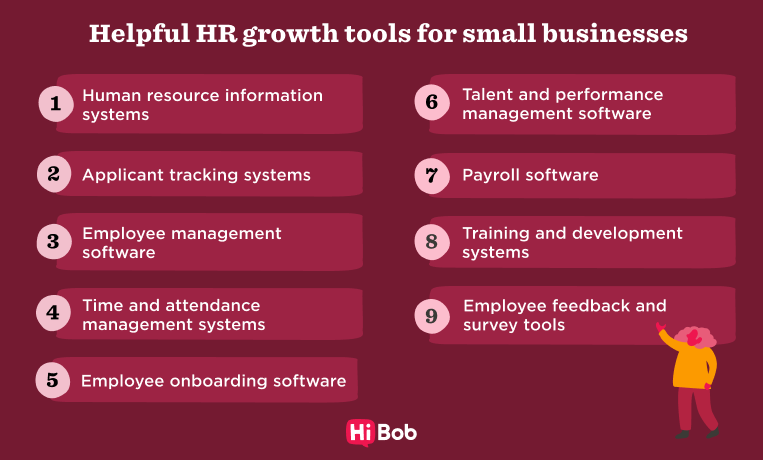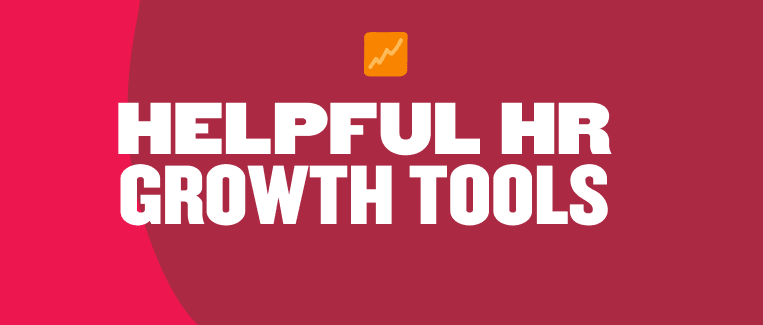For small businesses, growth isn’t just about scaling operations. It’s also about fostering a positive company culture that empowers their people to thrive.
Investing in HR growth tools can help organizations streamline their HR processes, enhance engagement, and encourage team member development. In this post, we’ll review how these strategic software solutions can kickstart your organization’s growth.
How can HR tools help small businesses grow?
HR tools help small businesses scale by reducing manual tasks for HR professionals, providing in-depth insights for HR planning, and improving team member experience and productivity.
HR process automation
HR growth tools automate repetitive HR tasks like job postings, payroll processing, and tracking absences. This frees up valuable time for HR professionals to focus on advanced HR strategies like succession planning, leadership development, company culture initiatives, and recruitment efforts. These advanced HR strategies can pave the way for intentional growth in the long and short term, without the need for additional headcount.
Upskilling opportunities
HR leaders can implement HR tools to identify skill gaps, assess training needs, and determine where their people can grow.
They can then implement learning and development programs, career pathing support, and performance tracking to close skills gaps and encourage career advancement. With a workforce trained in the most impactful skills for your organization, you can grow strategically and sustainably.
Improved employee experience
Organizations can use HR growth tools to improve their people’s experience. For example, self-service portals make it easier for team members to request paid time off (PTO), communicate with other team members, and understand their performance. This increases employee autonomy, reduces administrative bottlenecks, and creates an engaged and satisfied workforce.
Engaged team members tend to stay with an organization for a longer time, develop deep background knowledge about key business processes, and contribute meaningfully to company growth.
Helpful HR growth tools for small businesses
Learn about the core types of HR growth tools for small businesses to start planning your HR tech stack.

Human resource information system
A human resource information system (HRIS) stores, tracks, manages, monitors, and automates all data related to team members. Teams use an HRIS for improved data accuracy and accessibility with a single source of truth for all team member data, which paves the way for organization and clarity as they grow.
Capabilities
- Data entry automation
- Data tracking tools
- Work scheduling
- Compensation tracking
- Benefits administration
- Recruitment and retention information storage
- Training capabilities
- Self-service resources for candidates, team members, and managers
- Core HR data management
Applicant tracking systems
An applicant tracking system (ATS) simplifies and automates the recruiting process, allowing HR teams to move more swiftly to hiring an ideal new team member. An ATS helps HR teams post jobs, sort through candidates, and collaborate with internal team members so you can maintain a seamless recruitment and hiring process despite rapid growth.
Capabilities
- Securing resume and applicant information storage
- Candidate sourcing and sorting
- Applicant screening
- Scheduling interviews
- Sending customized emails to candidates automatically
- Organizing new hire paperwork
Employee management software
Employee management software helps organizations automate and streamline the core functions of employee management. This tool typically includes a team member database, absence management tools, onboarding process features, and payroll integrations.
Look for tools that allow you to create custom workflows that can adjust as you grow your team.
Capabilities
- Time and attendance management
- Secure data storage
- Employee communication tools
- Performance management features
- Learning and development tools
- Payroll processing
- Customizable reporting and analytics
Time and attendance management systems
Managing time and attendance can seem straightforward, but with a growing team, it can get complicated. Excel sheets and physical time cards can only go so far if you have a growing headcount. Use time and attendance management systems to accurately track hours and time off, produce flexible reports, integrate with compensation and benefits tools, and support compliance efforts.
Capabilities
- Time tracking tools for team members
- Leave balance tracking
- Leave management for HR teams
- Shift scheduling for managers
- Systems for approving hours
- Editable tracking tools for time corrections
- Customizable reports and analytics
- Features for fixing missing entries
- Remote hours logging
Employee onboarding software
The right employee onboarding software helps every new team member feel welcome. HR teams can use this growth tool to get people up to speed on company culture, systems, and goals. By standardizing and automating the onboarding process, all new hires receive a consistent experience.
Onboarding software can also scale effortlessly, supporting the company’s growth without sacrificing the quality of the onboarding experience.
Capabilities
- Secure document storage
- Custom onboarding and preboarding flows
- Automation capabilities for tracking onboarding tasks
- Culture-building features like event calendars
- In-depth reporting and analytics on team member progress
- E-signature enablement for contracts and compliance forms
- Resource libraries with handbooks, documentation, and training videos
- Communication tools like inter-team discussion boards
Talent and performance management software
Stay ahead with talent and performance management software by accessing strategic people data, identifying skill gaps, and tracking performance. Plan for the future with actionable retention insights and consider your future talent needs with plenty of time to budget and hire for them.
These platforms help you grow with precisely the right team and the skills for your business.
Capabilities
- Performance review management and scheduling
- Employee self-service tools for goal setting and tracking
- Coaching and mentoring platforms
- Skill gap analysis software
- Talent assessments
- Performance reporting
- Succession planning and career pathing support
Payroll software
Businesses may start by managing payroll manually, but this can get complex and time-consuming with a growing team. Use reliable payroll software to automate payroll calculations, pay distribution, and tax deductions. This reduces the chance of human error to ensure accurate and timely pay for all team members.
Capabilities
- Automates calculations for payment deductions and tax withholdings
- Tracks work hours and PTO
- Processes direct deposits
- Provides employee self-service portal for accessing pay stubs
- Secures information storage
- Processes updates according to new compliance requirements
- Offers reporting features for tax purposes
Training and development systems
Your workforce constitutes your greatest asset and one of the best ways to scale is helping your people grow and advance. Successful small businesses use training and development systems to retain loyal team members while honing and developing their skills.
Training tools and learning management systems (LMS) help businesses create, distribute, and track useful training materials and understand the skills of every team member. These platforms can also provide ongoing learning and development opportunities like certification programs, workshops, and personalized learning paths.
Training tools support retention and professional advancement, allowing you to grow steadily and maintain a competitive, skilled workforce.
Capabilities
- Goal-setting tools
- Course creation and delivery platforms
- Reporting and analytics for team member training performance
- Content creation and editing capabilities
- Personalized learning paths
- Built-in assessments
- Certification tools
- Gamification features like leaderboards and point systems
- Mobile access
Employee feedback and survey tools
The success of a small business can rely on the buy-in and dedication of early-stage team members. Small businesses can keep a finger on the pulse of team member satisfaction with surveys, questionnaires, virtual meetings, and anonymous feedback forms. These tools give team members space to voice issues, share suggestions, and offer insights into their work experience.
They’re a great opportunity to show your people you value their input and their experience. And in times of rapid growth, small businesses thrive on feedback and fast action.
Capabilities
- Tools and templates for creating and distributing forms and surveys
- Anonymous feedback options
- Survey results presented in a sharable format for transparency
- Integration with performance management systems
- Automated follow-up sequences
- Customizable analytics and reporting
How HR teams can support small business challenges
As a small business owner or HR team lead, you know the value of prioritizing your people. Thanks to a strong HR team and HR tech stack, your small business can:
- Improve efficiencies: When your HR team and top management professionals have to spend their time on menial, repetitive tasks, you lose out on countless hours of that talent. Invest in HR software that automates these processes to improve efficiency and your bottom line.
- Manage compliance: Non-compliance can lead to legal ramifications, fines, and downtime. One of HR’s core duties is to ensure that all business practices comply with labor laws and industry standards.
- Reduce turnover: With automated systems, HR teams can easily keep track of individual employee needs, leave timely feedback, and provide continuous development opportunities. Fostering a sense of belonging and encouraging career growth helps reduce turnover and create a more engaged, loyal workforce.
- Shorten time-to-hire: HR teams can use growth tools and data-driven insights to streamline hiring, reduce bottlenecks, and secure top talent faster.
- Grow quickly: If you’re dealing with inefficient processes, low productivity, and high turnover, the idea of opening new locations or increasing headcount can feel overwhelming. Put scalable HR processes in place with a robust HR team so you can grow and scale to your dream level.
What are some important HR policies for small businesses to know?
Small businesses experiencing quick growth and a season of steady hiring may catch themselves wondering: What HR policies do we need?
Start your business off on the right foot with these HR policies:
- Code of conduct: People thrive when they know what’s expected of them and what to expect from others. Outline expectations around attendance, ethics, confidentiality, and other acceptable workplace behavior and practices.
- Anti-discrimination: Ensure your business complies with all equal opportunity laws and foster a workplace based on respect and open-mindedness. Include information about your DEI&B strategies and prohibit harassment of any kind.
- Health and safety: Outline emergency procedures, reporting protocols, and safety standards to reduce injury and accidents for your team members.
- Time-off and leave policies: Team members need to know how to take a sick day or request PTO. Outline your time-off and leave policies to promote a healthy work-life balance and to encourage timely planning for future absences.
FAQs on HR tools for small businesses
Get answers to the most common questions about HR tools for small businesses.
What’s the role of HR in a small business?
In a small business, HR teams and software manage benefits, payroll, compensation, compliance, hiring, training, and much more. HR bridges the gap between broad, long-term company goals and the team members who will ultimately help execute them.
With the right tools, small business HR teams facilitate growth and create a positive, thriving, and strategic workforce.
Recommended For Further Reading
What is the best HR software for small businesses?
HiBob’s HR platform, Bob, is a great HR software for small businesses thanks to its ease of use, flexibility, and scalability. Integrate Bob with your existing tech stack and then customize it to fit your small business’ needs.
Use the right HR tools to grow your small business
HR growth tools help teams manage HR-related tasks while building a strong, values-driven workplace where every team member feels supported and connected. To scale efficiently, look for HR software that includes these various growth tools so you can access all of their features in one place.
With the right HR system, small businesses can create an environment where people are motivated, collaborative, and aligned with the organization’s goals, paving the way for long-term growth and success.


